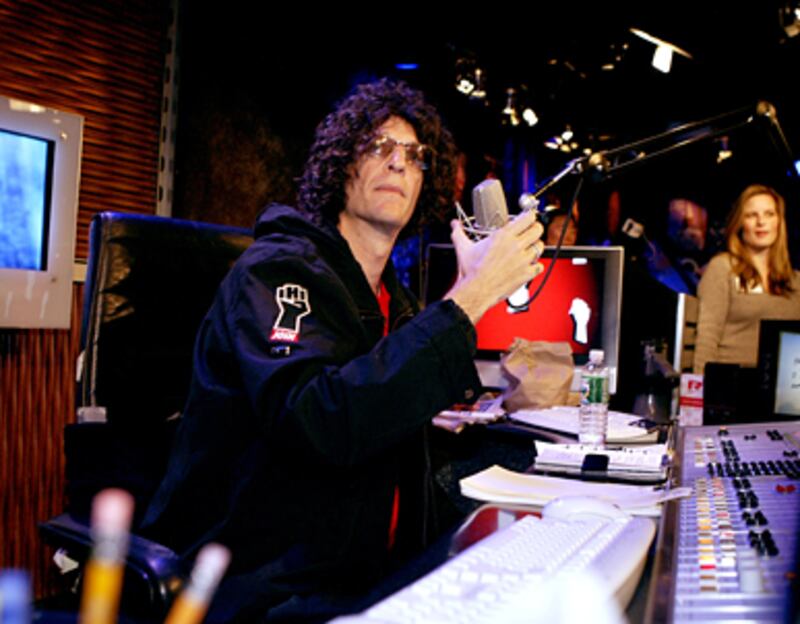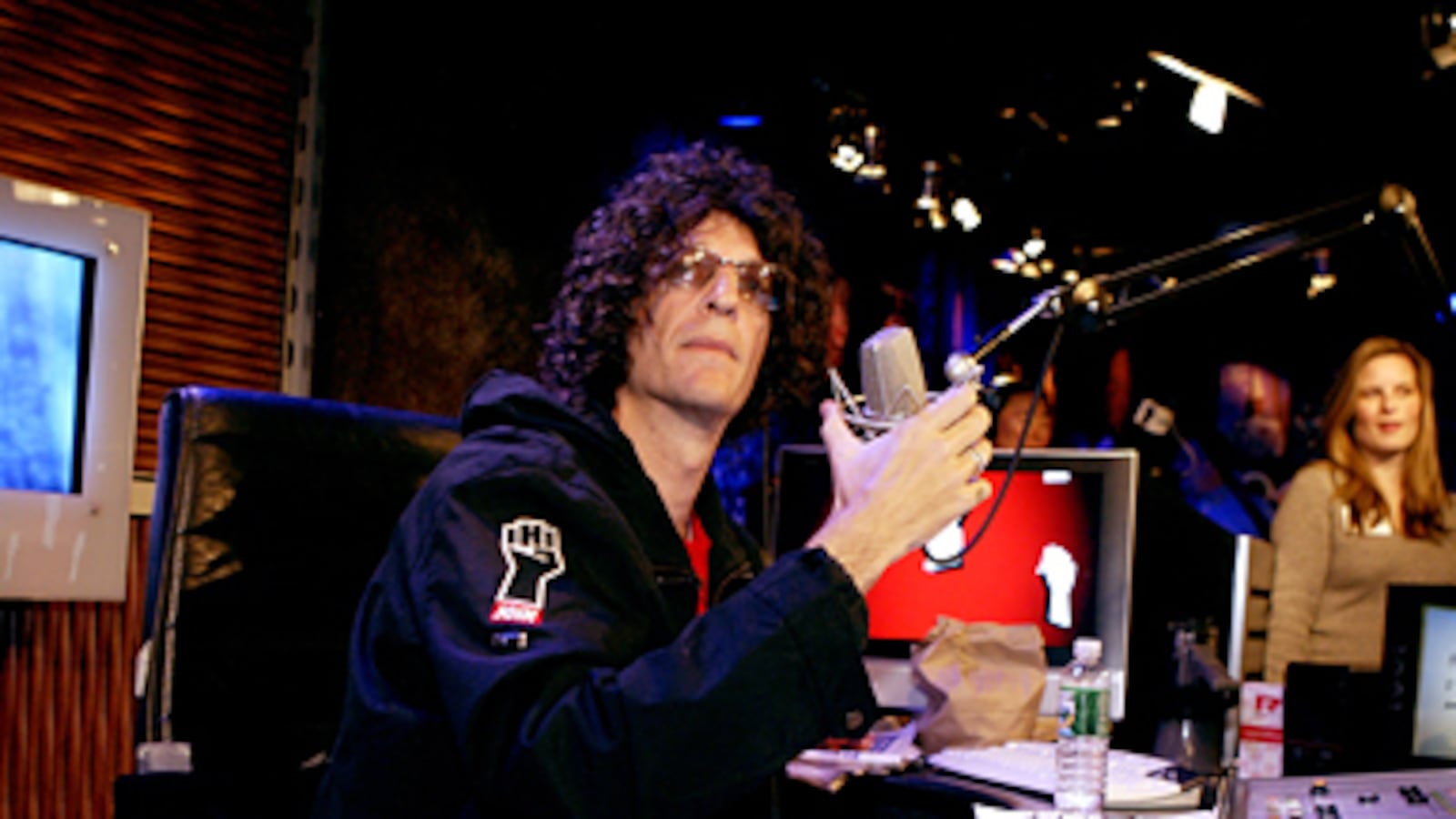Howard Stern’s new contract with Sirius XM Radio will pay him $2,008 for every minute on the air.
While terms of the lesbian-loving loudmouth’s new five-year deal with Sirius XM weren’t disclosed, two sources close to the situation say that Wall Street estimates of a $400 million contract, which works out to $80 million per year, are accurate. (Since the deal is a material event, Sirius XM will eventually have to disclose the precise details of Stern’s new contract in a regulatory filing.) These sources also say that Stern, closing in on 60, will likely scale back his workload by either a day per week or an hour per show.
Either way, after accounting for Stern’s eight weeks of vacation and 10 standard federal holidays, the shock jock will only be working 498 hours per year. Put another way, using an annual salary of $60 million—an estimated $20 million of Stern’s yearly compensation goes to production costs for the show and staff salaries, according to Wall Street analysts—the self-proclaimed King of All Media will be banking $120,482 per hour. That works out to $2,008 per minute. Should Stern keep the live broadcast at 4 hours but scale back his work week to 3 days, or 122 work days per year, he’d still make just under $492,000 per show.
A representative for Sirius XM did not respond to a request for comment.
Those numbers are not only in-line with Stern’s original, groundbreaking five-year, $500 million deal with Sirius in 2006, but also allows both sides to declare victory after a sometimes acrimonious year of negotiations.
Sirius XM executives have been telling Wall Street that they expected more favorable economic terms in contract renewal talks with talent ever since their merger was completed. Company CEO Mel Karmazin said that Sirius XM could save $100 million per year by not renewing Stern’s contract, for instance. Moreover, just this week, Sirius XM CFO David Frear reiterated the point at a media investor conference hosted by UBS.
“I am not taking a f---ing pay cut,” Stern said on his show in response to Frear’s comments. “Why would I have to take a pay cut? Who is this guy to say this in public?”
A master of negotiating in public, Stern all year long used his show as leverage against Sirius XM. There was the bogus rumor earlier in the year that he was in the running to replace Simon Cowell as a judge on American Idol. Last week another bogus rumor surfaced that Stern was close to inking a $600 million, three-year deal with Apple’s iTunes. Stern even said on his show Thursday while announcing the deal that he talked with satellite, terrestrial, and Internet radio companies throughout the year.
Stern is directly responsible for between $187 million and $234 million of Sirius XM's bottom line.

“Howard is a great talent and we are thrilled that he will continue to provoke, engage and entertain on Sirius XM,” said Karmazin in a statement. “Howard forever changed radio and was instrumental in putting Sirius on the map when he first launched on satellite radio. He is one of the few ‘one-name’ entertainers in the country.”
Indeed, Sirius was on the brink of bankruptcy before Stern arrived. His hiring was without question the single most important event in satellite radio's short history. And though it’s impossible to determine the precise number of people who subscribe to Sirius XM solely because of Stern since the company doesn’t breakout the figures, analysts put the number between 2 million and 2.5 million.
The real number may be higher. At the end of 2005, the year before Stern began infiltrating the satellite airwaves with his raucous brand of humor and cadre of castoff characters, Sirius has 3.3 million subscribers. By the end of 2006, it had 6 million subscribers, and a year later that number had grown to 8.3 million. Now, after merging with rival XM, the company has more than 20 million subscribers. (For some perspective, that is more subscribers than Time Warner Cable or DirecTV.)
But even using the conservative estimates of Wall Street analysts, Stern is still clearly a revenue rainmaker for Sirius XM. Using the basic subscription price of $13 per month, or $156 per year, Stern loyalists account for gross annual revenue of between $312 million and $390 million, respectively. Sirius banks about 60 percent of that revenue, which means that Stern is directly responsible for between $187 million and $234 million of Sirius XM's bottom line. Using those figures, Stern has generated between $935 million and $1.2 billion in revenue for Sirius XM since the signing of his original contract.
Small wonder then that Sirius XM is willing to pay so much for a guy that works less than one-third of the year. (The company supplements the live show with specials like The Wrap-Up Show, Superfan Roundtable, and other shows hosted by Stern sidekicks that allow it to capitalize on the Stern name without actually featuring the shock jock himself.)
Stern’s new contract, which runs through December 31, 2015, also gives Sirius XM mobile rights to his show, meaning that the company can market and promote Stern to drive subscribers to its iPhone, iPod, BlackBerry, and Android-powered applications. To be sure, the company noted rather prominently in its press release announcing the deal that Stern has been able to parlay his radio fame into two bestselling books— Private Parts and Miss America—a highly successful film and soundtrack, and pay-per-view specials.
“Access to my show on mobile devices will open up additional opportunities for my fans to hear me wherever they are,” Stern said in a statement.
That’s what Sirius XM is hoping, and why they are willing to pay him $2,008 per minute to stay with the company.
Peter Lauria is senior correspondent covering business, media, and entertainment for The Daily Beast. He previously covered music, movies, television, cable, radio, and corporate media as a business reporter for The New York Post. His work has also appeared in Avenue, Blender, and Media Magazine, and he's appeared on CNBC, Bloomberg, BBC Radio, and Reuters TV.





